#the letters of jrr tolkien
Explore tagged Tumblr posts
Text
I know I've ranted about it a million times, but every time someone brings up Roman, Byzantine, and Egyptian inspirations/influences on Gondor in more mainstream Tolkien fandom spaces (not me, because I don't even talk about it off Tumblr/DW), it seems like there's always someone who gets super weird and defensive about it. I've seen so many "well actually there's no need to consider any influences outside of England, mythology for England blah blah" responses.
And it's like! Oh, you want to play the decontextualized Tolkien quotes game? How about this one:
“But this [the setting of LOTR] is not a purely 'Nordic' area in any sense. If Hobbiton and Rivendell are taken (as intended) to be at about the latitude of Oxford, then Minas Tirith, 600 miles south, is at about the latitude of Florence [in Italy]. The Mouths of Anduin and the ancient [Gondorian] city of Pelargir are at about the latitude of ancient Troy [in Turkey]. Auden has asserted that for me 'the North is a sacred direction.' That is not true. The North-west part of Europe, where I (and most of my ancestors) have lived, has my affection, as a man’s home should. I love its atmosphere, and know more of its histories and languages than I do of other parts; but it is not ‘sacred’, nor does it exhaust my affections. I have, for instance, a particular love for the Latin language, and among its descendants for Spanish ... The progress of the tale ends in what is far more like the re-establishment of an effective Holy Roman Empire with its seat in Rome than anything that would be devised by a 'Nordic.'”
Or this one:
we come [in ROTK] to the half-ruinous Byzantine City of Minas Tirith
Or:
In the south Gondor rises to a peak of power, almost reflecting Númenor, and then fades slowly to decayed Middle Age, a kind of proud, venerable, but increasingly impotent Byzantium.
Or:
The Númenóreans of Gondor were proud, peculiar, and archaic, and I think are best pictured in (say) Egyptian terms. In many ways they resembled ‘Egyptians’ - the love of, and power to construct, the gigantic and massive. And in their great interest in ancestry and in tombs. […] I think the crown of Gondor (the S. Kingdom) was very tall, like that of Egypt, but with wings attached, not set straight back but at an angle. The N. Kingdom had only a diadem (III 323). Cf. the difference between the N. and S. kingdoms of Egypt.
Or:
Thank you very much for your letter. … It came while I was away, in Gondor (sc. Venice), as a change from the North Kingdom
Middle-earth is not equivalent to England, or northern Europe in general, and Gondor especially is not northern at all!
#fun fact: in the full letter it comes from tolkien concludes the mythology for england quote with 'absurd.'#and he specifically used gondor as a counter-example to the 'nordic' image of middle-earth#like it's literally explicitly stated by tolkien that gondor is not meant to be analogous to england or northern europe at all#anghraine rants#legendarium blogging#jrr tolkien#gondor#ondonórë blogging#lord of the rings#the letters of jrr tolkien#legendarium fanwank
1K notes
·
View notes
Text
In an undated letter written in the late 1950s, reproduced in THE LETTERS OF JRR TOLKIEN, Tolkien alludes to the legal difficulties Sam faced after returning from the Grey Havens at the end of LORD OF THE RINGS:
When Master Samwise reported the ‘departure over Sea’ of Bilbo (and Frodo) in 1421, it was still held impossible to presume death; and when Master Samwise became Mayor in 1427, a rule was made that: ‘if any inhabitant of the Shire shall pass over Sea in the presence of a reliable witness, with the expressed intention not to return, or in circumstances plainly implying such an intention, he or she shall be deemed to have relinquished all titles rights or properties previously held or occupied, and the heir or heirs thereof shall forthwith enter into possession of these titles, rights, or properties, as is directed by established custom, or by the will and disposition of the departed, as the case may require.’
You can see how the residents of Hobbiton might have seen Sam's return as the premise of a kind of Agatha Christie mystery plot: favorite servant of eccentric middle-aged local resident departs on an unexpected journey with his master; returns home alone two weeks later; and then conveniently produces a copy of said eccentric local resident's new will, naming the servant the heir to all his property — and the only account the servant can offer of his master's whereabouts is a preposterous story about Elves. Suspicious! Very suspicious indeed!
#books#lord of the rings#lotr#jrr tolkien#the letters of jrr tolkien#letter 214#sam gamgee#frodo baggins#the grey havens#this is funnier if you bear in mind the scene at the beginning#where the hobbits in bywater are gossiping about whether frodo's parents actually murdered each other#rather than being *accidentally* drowned in the brandywine river
513 notes
·
View notes
Text
Favourite Female Tolkien Character Poll - Round 3, Match 10
Today is the last set of polls for round 3!
Dís
The sister of Thorin, and mother of Fili and Kili. She lost all three of them in the same day, at the Battle of Five Armies.
Dís was the daughter of Thráin II. She is the only dwarf-woman named in these histories. It is said by Gimli that there are few dwarf-women, probably no more than a third of the whole people. They seldom walk abroad except at great need. They are in voice and appearance, and in garb if they must go on a journey, so like to the dwarf-men that the eyes and ears of other peoples cannot tell them apart.
Pearl Took
Quotation is from The Letters of J.R.R. Tolkien, letter 214:
A well-known case, also, was that of Lalia the Great (or less courteously the Fat). Fortinbras II, one time head of the Tooks and Thain, married Lalia of the Clayhangers in 1314 [Shire-reckoning], when he was 36 and she was 31. He died in 1380 at the age of of 102, but she long outlived him, coming to an unfortunate end in 1402 at the age of 119. So she ruled the Tooks and the Great Smails for 22 years, a grand and memorable, if not universally beloved, ‘matriarch’. She was not at the famous Party (SY 1401), but was prevented from attending rather by her great size and immobility than by her age. Her son, Fenumbras, had no wife, being unable (it was alleged) to find anyone willing to occupy apartments in the Great Smials, under the rule of Lalia. Lalia, in her last and fattest years, had the custom of being wheeled to the Great Door, to take the air on a fine morning. In the spring of SY 1402 her clumsy attendant let the heavy chair run over the threshold and tipped Lalia down the flight of steps into the garden. So ended a reign and life that might well have rivalled that of the Great Took.
It was widely rumoured that the attendant was Pearl (Pippin’s sister), though the Tooks tried to keep the matter within the family. At the celebration of Fenumbras’ accession the displeasure and regret of the family was formally expressed by the exclusion of Pearl from the ceremony and feast; but it did not escape notice that later (after a decent interval) she appeared in a splendid necklace of her name-jewels that had long lain in the hoard of the Thains.
Pearl was Pippin’s older sister. She was 27 at the time of the incident; Pippin was twelve. All his siblings had P-names (Pearl, Pimpernel, Pervinca, Peregrin).
#favourite female tolkien character poll#dís#pearl took#dwarves#hobbits#the hobbit#the letters of jrr tolkien#the lord of the rings#tolkien#thorin#pippin took
23 notes
·
View notes
Text

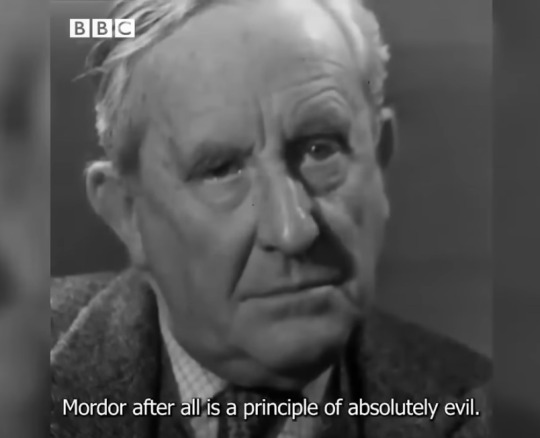
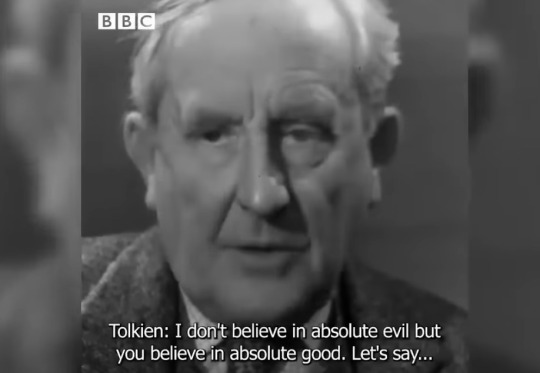
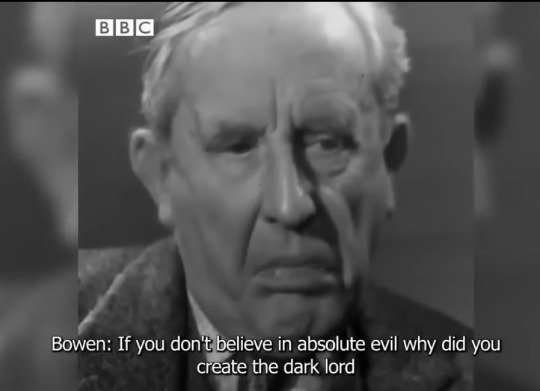
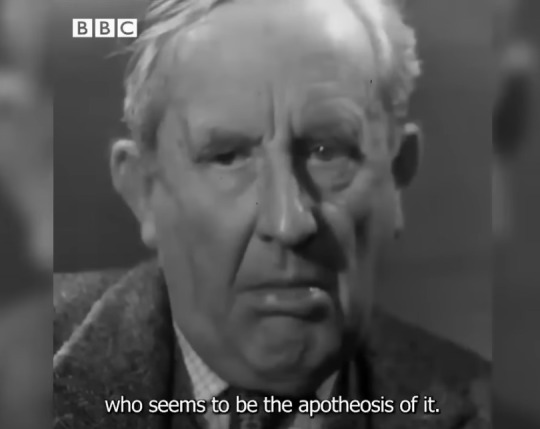
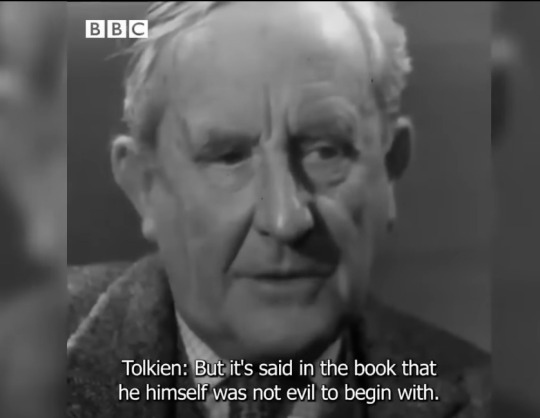

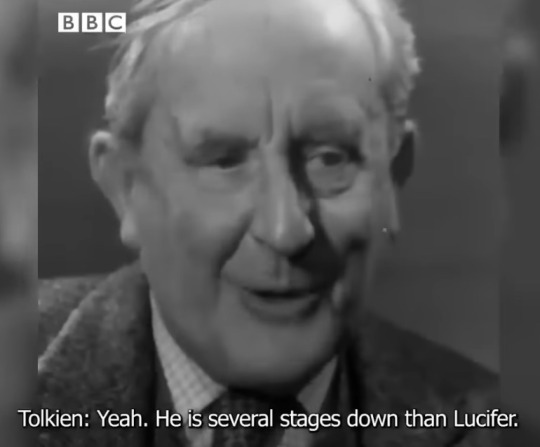
How to politely tell someone who doesn’t understand your work to fuck off: Professor Tolkien edition
Tolkien talks about Sauron and “absolute evil” in his legendarium
“In my story I do not deal in Absolute Evil. I do not think there is such a thing, since that is Zero. I do not think that at any rate any 'rational being’ is wholly evil.” […] Some critics seem determined to represent me as a simple-minded adolescent, inspired with, say, a With-the-flag-to-Pretoria spirit, and wilfully distort what is said in my tale. I have not that spirit, and it does not appear in the story.” Tolkien Letter 183
#also the “lucifer” here is morgoth not sauron#tolkien#jrr tolkien#sauron#mairon#mordor#tolkien legendarium#tolkien lore#middle earth#lord of the rings#tolkien letters
252 notes
·
View notes
Text
Reading The Hobbit has a warm, cozy feeling to it, like sitting by a fireplace and downing a warm mug of hot chocolate. There are times when you want to cry, times when you want to laugh, times when you want to fight alongside Thorin’s Company. But at the end of the story, you realise that you will never experience that, because The Hobbit is fictional in reality, but so real in the heart and mind.
Reading The Lord of The Rings has a cool feeling, neither warm nor cold, but a comfortable one; it’s as if you’re sitting by a window, staring into the rain, and wishing you could go outside and relish in the rain but you can’t because it’s cold. There are times when you want to laugh, cry, dine with the Fellowship, fight with the Fellowship. But you can’t, because The Lord of The Rings is only a figment lodged in your heart, tucked away in a cozy spot.
Reading The Silmarillion has the feel of sitting in an enormous library almost abandoned, and fishing out an old, dusty book from a nook long forgotten, written about the history of the world. There are cases when you want to delve into that world and explore it, revel in it, fight it, love it, yell at the people in it. But you can never do that, because it is a history long past, existing only in the minds of very few.
Reading the old stories narrating the entire history of Arda has the feel of travelling back in time to the Library of Alexandria, reading and studying all the library can give. There are times when you want to cry, mourn, grieve, celebrate, laugh, revel in the world. But you can never, as that world, those people, are all part of your heart and mind, tucked away into the most precious part of you.
Reading the legendarium doesn’t make you want to be a part of that world because you love it. It makes you want to be a part of that world because the characters are normal people, like you, who got roped into an unlikely adventure, forever narrated in song, poems, ballads and laments.
They are simple stories, of simple people, in a simple world, where if you existed, you could have been one of those souls both fortunate and unfortunate.
Reading the legendarium makes you want to be part of it, because it makes you think you can survive it.
And certainly, if you have read this amazing mythological masterpiece, you absolutely can survive it.
#jrr tolkien#tolkien#silmarillion#the silmarillion#the silm#the silm fandom#lord of the rings#the two towers#the fellowship of the ring#return of the king#the hobbit#an unexpected journey#desolation of smaug#battle of the five armies#children of hurin#the tale of beren and luthien#beren and luthien#akallabeth#the fall of numenor#unfinished tales#history of middle earth#tolkien povs#the fall of gondolin#the letters of tolkien#the book of lost tales#lays of beleriand#the lost road#history of middle-earth#the return of the shadow#the nature of middle earth
387 notes
·
View notes
Text
One funny difference between J. R. R. Tolkien and C. S. Lewis is that Tolkien seemed entirely uninterested in writing about sex, whereas Lewis's writing was also chaste but with barely repressed kinkiness simmering just beneath the surface
#lemme put it this way#my first thought when i learned that lewis signed some of his letters as 'lover of the whip' before his reconversion#even just going by my memory of the narnia books#was 'huh that would explain some things'#tolkien#j. r. r. tolkien#j.r.r. tolkien#j r r tolkien#jrr tolkien#jirt#c. s. lewis#c.s. lewis#c s lewis#cs lewis
515 notes
·
View notes
Text

#they liked to do that to each other#like true literary homies#c.s. lewis#jrr tolkien#cs lewis#the screwtape letters
110 notes
·
View notes
Text

✨🍃📖
#not all who wander are lost#jrr tolkien#jrrt#lord of the rings#lotr#lotr fanart#typography#lettering#the hobbit#hobbit fanart#cozycore#bookblr#digital illustration#artists on tumblr
87 notes
·
View notes
Text










The Elves of Eregion made Three supremely beautiful and powerful rings, almost solely of their own imagination, and directed to the preservation of beauty: they did not confer invisibility. But secretly in the subterranean Fire, in his own Black Land, Sauron made One Ring, the Ruling Ring that contained the powers of all the others, and controlled them, so that its wearer could see the thoughts of all those that used the lesser rings, could govern all that they did, and in the end could utterly enslave them. He reckoned, however, without the wisdom and subtle perceptions of the Elves. The moment he assumed the One, they were aware of it, and of his secret purpose, and were afraid. They hid the Three Rings, so that not even Sauron ever discovered where they were and they remained unsullied. The others they tried to destroy.
#Silmarillion#JRR Tolkien's 1951 Letter to Milton Waldman#JRR Tolkien#Tolkien#Three Rings#Three Rings for the Elven kings under the sky#TROP#The Rings of Power#Rings of Power#mine#my edit#LOTR#Lord of the Rings#The Lord of the Rings#Elrond#Robert Aramayo#Galadriel#Morfydd Clark#Celebrimbor#Charles Edwards#Mairon#Sauron#Halbrand#Charlie Vickers#One Ring to rule them all#One Ring
71 notes
·
View notes
Text
I did the Riddle of Strider 🫡
#lotr#lord of the rings#lotr fanart#tolkien#tolkien fanart#hobbit#hobbit lettering#lotr art#tolkien art#middle earth#jrr tolkien#artists on tumblr#my calligraphy#video#aragorn
406 notes
·
View notes
Note
Hi! Can you explain what really the power of foresight was with Faramir? I read the books earlier this year and I don't really quite understand it. He could predict the future? Like he would see it in his dreams? But how did he found out from Gollum that he was taking frodo and sam to cirith ungol and that he had committed murder before?
No problem, it's one of my favorite topics!
The concise explanation: I think Faramir's foresight/aftersight in terms of visions is a largely separate "power" from his ability to bring his strength of mind and will to bear on other people and animals, and to resist outside influence. The visions seem more a matter of broad sensitivity, something Faramir doesn't appear to have much if any control over. The second power is (in our terms) essentially a form of direct telepathy, limited in some ways but still very powerful, and I think this second ability is what Faramir is using with Gollum.
The really long version:
In my opinion, Faramir (or Denethor, Aragorn, etc) doesn't necessarily read thoughts like a book, particularly not with a mind as resistant as Gollum's. Faramir describes Gollum's mind in particular as dark and closed, it seems unusually so—
"There are locked doors and closed windows in your mind, and dark rooms behind them," said Faramir.
Still, Gollum is unable to entirely block Faramir's abilities. In LOTR, it does not seem that Gollum can fully block powerful mental abilities such as Faramir's, though his toughness and hostility does limit what Faramir can see. (Unfinished Tales, incidentally, suggests iirc that Denethor's combination of "great mental powers" and his right to use the Anor-stone allowed him to telepathically get the better of Saruman through their palantíri, a similar but greater feat.) I imagine that this is roughly similar to, but scaled down from, Galadriel's telepathic inquiries of even someone as reluctant to have her in his mind as Boromir, given that Faramir is able to still see some things in Gollum's mind, if with more difficulty than usual.
(WRT Boromir ... ngl, if I was the human buffer between Denethor and Faramir, I would also not be thrilled about sudden telepathic intrusions from basically anyone, much less someone I had little reason to trust.)
Disclaimer: a few years after LOTR's publication, Tolkien tried to systematize how this vague mystical telepathy stuff really works. One idea he had among many, iirc, was that no unwilling person's mind could be "read" the ways that Gollum's is throughout LOTR. IMO that can't really be reconciled w/ numerous significant interactions in LOTR where resistance to mental intrusion or domination is clearly variable between individuals and affected by personal qualities like strength of will, basic resilience, the effort put into opposition, supernatural powers, etc. And these attempts at resistance are unsuccessful or only partially successful on many occasions in LOTR (the Mouth of Sauron, for one example, is a Númenórean sorcerer in the book who can't really contend with Aragorn on a telepathic level). So I, personally, tend to avoid using the terminology and rationales from that later systematized explanation when discussing LOTR. And in general, I think Tolkien's later attempts to convert the mystical, mysterious wonder of Middle-earth into something more "hard magic" or even scientific was a failed idea on a par with Teleporno. Others differ!
In any case, when Gollum "unwillingly" looks at Faramir while being questioned, the creepy light drains from his eyes and he shrinks back while Faramir concludes he's being honest on that specific occasion. Gollum experiences physical pain when he does try to lie to Faramir—
"It is called Cirith Ungol." Gollum hissed sharply and began muttering to himself. "Is not that its name?" said Faramir turning to him. "No!" said Gollum, and then he squealed, as if something had stabbed him.
I don't think this is a deliberate punishment from Faramir—that wouldn't be like him at all—and I don't think it's the Ring, but simply a natural consequence of what Faramir is. Later, Gandalf says of Faramir's father:
"He can perceive, if he bends his will thither, much of what is passing in the minds of men ... It is difficult to deceive him, and dangerous to try."
So, IMO, Faramir's quick realization that Gollum is a murderer doesn't come from any vision of the future or past involving Gollum—that is, it's not a deduction from some event he's seen. Faramir does not literally foresee Gollum's trick at Cirith Ungol. His warning would be more specific in that case, I think. What he sees seems to be less detailed but more direct and, well, mystical. Faramir likely doesn't know who exactly Gollum murdered or why or what any of the circumstances were. Rather, Gollum's murderousness and malice are visible conditions of his soul to Faramir's sight. Faramir doesn't foresee the particulars of Gollum's betrayal—but he can see in Gollum's mind that he is keeping something back. Faramir says of Gollum:
"I do not think you are holden to go to Cirith Ungol, of which he has told you less than he knows. That much I perceived clearly in his mind."
Meanwhile, in a letter written shortly before the publication of LOTR, Tolkien said of Faramir's ancestors:
They became thus in appearance, and even in powers of mind, hardly distinguishable from the Elves
So these abilities aren't that strange in that context. Faramir by chance (or "chance") is, like his father, almost purely an ancient Númenórean type despite living millennia after the destruction of Númenor (that destruction is the main reason "Númenóreanness" is fading throughout the age Faramir lives in). Even less ultra-Númenórean members of Denethor's family are still consistently inheriting characteristics from their distant ancestor Elros, Elrond's brother, while Faramir and Denethor independently strike Sam and Pippin as peculiarly akin to Gandalf, a literal Maia like their ancestress Melian:
“Ah well, sir,” said Sam, “you [Faramir] said my master had an elvish air; and that was good and true. But I can say this: you have an air too, sir, that reminds me of, of—well, Gandalf, of wizards.”
He [Denethor] turned his dark eyes on Gandalf, and now Pippin saw a likeness between the two, and he felt the strain between them, almost as if he saw a line of smouldering fire drawn from eye to eye, that might suddenly burst into flame.
Meanwhile, Faramir's mother's family is believed to be part Elvish, a belief immediately confirmed when Legolas meets Faramir's maternal uncle:
At length they came to the Prince Imrahil, and Legolas looked at him and bowed low; for he saw that here indeed was one who had elven-blood in his veins. "Hail, lord!" he [Legolas] said. "It is long since the people of Nimrodel left the woodlands of Lórien, and yet still one may see that not all sailed from Amroth’s haven west over water."
In addition to that, Faramir's men believe he's under some specific personal blessing or charm as well as the Númenórean/Elvish/Maia throwback qualities. It's also mentioned by different groups of soldiers that Faramir can exercise some power of command over animals as well as people. Beregond describes Faramir getting his horse to run towards five Nazgûl in real time:
"They will make the Gate. No! the horses are running mad. Look! the men are thrown; they are running on foot. No, one is still up, but he rides back to the others. That will be the Captain [Faramir]: he can master both beasts and men."
Then, during the later retreat of Faramir's men across the Pelennor:
At last, less than a mile from the City, a more ordered mass of men came into view, marching not running, still holding together. The watchers held their breath. "Faramir must be there," they said. "He can govern man and beast."
Tolkien said of the ancient Númenóreans:
But nearly all women could ride horses, treating them honourably, and housing them more nobly than any other of their domestic animals. The stables of a great man were often as large and as fair to look upon as his own house. Both men and women rode horses for pleasure … and in ceremony of state both men and women of rank, even queens, would ride, on horseback amid their escorts or retinues … The Númenóreans trained their horses to hear and understand calls (by voice or whistling) from great distances; and also, where there was great love between men or women and their favorite steeds, they could (or so it is said in ancient tales) summon them at need by their thought alone. So it was also with their dogs.
Likely the same Númenórean abilities were used for evil by Queen Berúthiel against her cats. In an interview with Daphne Castell, Tolkien said:
She [Berúthiel] was one of these people who loathe cats, but cats will jump on them and follow them about—you know how sometimes they pursue people who hate them? I have a friend like that. I’m afraid she took to torturing them for amusement, but she kept some and used them—trained them to go on evil errands by night, to spy on her enemies or terrify them.
The more formal version of the Berúthiel lore recurs in Unfinished Tales:
She had nine black cats and one white, her slaves, with whom she conversed, or read their memories, setting them to discover all the dark secrets of Gondor, so that she knew those things "that men wish most to keep hidden," setting the white cat to spy upon the black, and tormenting them.
Faramir, by contrast, has a strong aversion to harming/killing animals for any reason other than genuine need, but apparently quite similar basic abilities. He typically uses these abilities to try to compassionately understand other people or gather necessary information, rather than for domination or provoking fear. Even so, Faramir does seem to use his mental powers pretty much all the time with no attempt to conceal what he's doing—he says some pretty outlandish things to Frodo and Sam as if they're very ordinary, but it doesn't seem that most people he knows can do all these things. This stuff is ordinary to him because it flows out of his fundamental being, not because it's common.
It's not clear how much fine control he has, interestingly. This is more headcanon perhaps, but I don't feel like it's completely under his control, even while it's much more controlled than things like Faramir's vision of Boromir's funeral boat, his frequent, repeated dreams of Númenor's destruction, the Ring riddle dream he received multiple times, or even his suspiciously specific "guess" of what passed between Galadriel and Boromir in Lothlórien. Yet his more everyday mental powers do seem to involve some measure of deliberate effort in a lot of the instances we see, given the differing degrees of difficulty and strain we see with the powers he and Denethor exhibit more frequently and consistently.
This is is also interesting wrt Éowyn, because Tolkien describes Faramir's perception of her as "clear sight" (which I suspect is just Tolkien's preferred parlance for "clairvoyance"). Faramir perceives a lot more of what's going on with Éowyn than I think he had materially observable evidence for—but does not see everything that's going on with her by any means. He seems to understand basically everything about her feelings for Aragorn, more than Éowyn herself does, but does not know if she loves him [Faramir].
I'm guessing that it's more difficult to "see" this way when it's directly personal (one of the tragedies of his and Denethor's relationship is that their shared mental powers do not enable either to realize how much they love each other). But it also doesn't seem like he's trying to overcome Éowyn's mental resistance the way he was with Gollum, and possibly Frodo and Sam—he does handle it a bit differently when it's not a matter of critical military urgency. With Éowyn, he sees what his abilities make clear to him, is interested enough to seek out Merry (and also perceive more than Merry says, because Faramir has never been a normal person one day in his life) but doesn't seem to really push either of them.
So I tend to imagine that with someone like Faramir, Denethor, Aragorn etc, we're usually seeing a relatively passive, natural form of low-grade telepathy that simply derives from their fundamental nature and personalities (as we see in Faramir with Éowyn, possibly Faramir with Aragorn). That can be kicked up to more powerful, forceful telepathy via active exertion of the will (as described by Gandalf wrt Denethor's ability to "bend[] his will thither" to see what passes in others' minds, and seen with Faramir vs Gollum, Aragorn vs the Mouth of Sauron, more subtly Faramir vs Denethor). At a high point of strain this can be done very aggressively or defensively (Denethor vs Gandalf, Denethor vs Saruman, Denethor vs Sauron seriously is there a Maia that man won't fight, Faramir vs the Black Breath given his completely unique symptoms that Aragorn attributes to his "staunch will", possibly Aragorn vs the Black Breath in a healing capacity...).
Anyway, I hope these massive walls of text are helpful or interesting! Thanks for the ask :)
#honestly hilarious that first age men straight-up lie to the fëanorians and nobody has any idea#gollum says a one-word falsehood to faramir and starts screaming. some people are just made different i guess#(more seriously i think these abilities are so different between lotr and the silm because of narrative structure and functions#faramir and denethor aren't insignificant but are placed in such a way that their abilities support lotr's structural integrity#rather than breaking the logic of the story the way really-good-at-telepathy fëanorians would#...hence the awkwardness of finding something for galadriel and celeborn to be doing lmao. the real problem children of tolkien lore!#aragorn /is/ central enough to cause problems but his abilities are less specifically focused on telepathy so it works#i bet random citizens of pelargir felt that berúthiel's very faramir-ish abilities were absolutely OP though#...justice for gondorian cats honestly. i know tolkien was weird about feline life but i choose to believe faramir is a friend to cats)#anghraine babbles#legendarium blogging#legendarium fanwank#anon replies#respuestas#faramir#jewel of the seashore#húrinionath#denethor#sméagol#lord of the rings#jrr tolkien#anghraine's meta#long post#the letters of jrr tolkien#nature of middle earth#berúthiel#anghraine's headcanons#éowyn
194 notes
·
View notes
Text
Something that bugs me a little about the reactions to LORD OF THE RINGS is the way that fans pointedly overlook the sometimes uneasy class politics that are involved in the relationship between Frodo and Sam.
This is in no way denying that it's a homoerotic relationship, which is something that comes through vividly even in the weird, truncated Rankin-Bass RETURN OF THE KING animated adaptation from 1980. However, it's important to understand that until the last few pages of the novel, Sam is literally Frodo's servant.
Tolkien is quick to stress, as stories from class-conscious societies often do, that Sam is happy and eager to serve Frodo, and willingly does so even when there's nothing in it for him, but the story emphasizes throughout that Sam is not the social equal of Frodo, Merry, Pippin, or Bilbo. When Sam calls Frodo "Master," it's not a D/S thing; Sam is Frodo's household employee (and in a sense his batman, which Tolkien said was the inspiration for their interactions), having essentially inherited that role from his father, who was Bilbo's employee. When, in the final chapter, Frodo tells Sam to marry Rosie Cotton and movie her into Bag End, he isn't proposing a menage à trois, he is offering to hire Rosie so that Sam can combine his marriage with his full-time duties. It isn't until Frodo tells Sam, on the way to the Grey Havens, that he has made Sam his heir that Sam becomes Frodo's social equal and the master of Bag End rather than the head of its staff. (Tolkien implies elsewhere that this caused Sam some legal trouble, since there was no indication that Frodo was dead or permanently gone — and if Merry and Pippin hadn't been there to witness Frodo's departure, people would have wondered if Sam did away with his master to try to steal his estate.)
Moreover, Tolkien expressly links Sam's perseverance, loyalty, and ability to resist the power of the Ring to his knowing his place. Toward the beginning, Sam's father recalls telling him:
‘Elves and Dragons! I says to him. Cabbages and potatoes are better for me and you. Don’t go getting mixed up in the business of your betters, or you’ll land in trouble too big for you, I says to him. And I might say it to others,’ he added with a look at the stranger and the miller.
Later (in "The Tower of Cirith Ungol"), Sam is tempted by the Ring, which shows him wild fantasies of his overthrowing Sauron and building a garden in the vale of Gorgoroth. However:
In that hour of trial it was the love of his master that helped most to hold him firm; but also deep down in him lived still unconquered his plain hobbit-sense: he knew in the core of his heart that he was not large enough to bear such a burden, even if such visions were not a mere cheat to betray him. The one small garden of a free gardener was all his need and due, not a garden swollen to a realm; his own hands to use, not the hands of others to command.
The word "free" is doing a lot of work here, since Sam is, back in the safety of Hobbiton, quite literally a hand for others to command; he tends Frodo's garden, not his own. But the point is that he recognizes his humble, inferior position in society and accepts it "freely," and that that choice gives Sam what Gandalf might have called the strength and good purpose to heroically resist a temptation that more noble and lordly types like Boromir could not.
My point is not that Sam doesn't love Frodo, which obviously he does, or the reverse, which the narrative makes plain. However, if you are not so reflexively comforted by classist fantasies of this kind, it's hard not to periodically stop and wonder, "Is this sexual harassment?"
#books#lord of the rings#lotr#jrr tolkien#frodo baggins#sam gamgee#tolkien discusses sam's inheritance struggles in letter 214 of#the letters of jrr tolkien#if you're interested
30 notes
·
View notes
Text
I love when the Tolkien fandom comes together to discuss the big questions of the legendarium. Like Sauron’s sex life.
And sometimes we do find pearls on Reddit:



While I overall agree with this, I have some observations to make:
Sex is not absent from the legendarium. It’s absent from the “core” books like the “Lord of the Rings” trilogy and “The Hobbit”. In “The Silmarillion”, we have to read among the lines. So, when someone says there’s no sex going in Tolkien, I can already tell they never read anything else outside of these books. Tolkien cared enough about sex to write essays on Elves, Orcs and Men reproduction.
Melian wasn’t the only Ainur who ended up bound to a physical form; Morgoth chose to bound himself to his physical form, and Sauron also ended up bound to his physical form because of the One ring. It’s more like a consequence, than an actual punishment, if you ask me. In “Morgoth’s Ring”, Tolkien talks about Balrogs and Orcs reproducing and how the Balrogs would become bound to a Orc physical form, so it’s not that out of pocket to assume this might have happened, and Morgoth had Balrogs and Orcs breeding (with the Balrog taking on a Orc physical form, obviously). Also, the Balrogs are “Úmaiar”, which means they were among the first Maiar to harmonize with Morgoth during the Music (Ainulindalë), unlike Sauron/Mairon who harmonized with Aulë at the beginning.
About “Mairon” not being Sauron’s original name; sure, it’s his Quenya name, but so is every Ainur name in the legendarium. We don’t know the Valarin name of the majority of these deities, it’s not exclusive to Mairon. And in “Parma Eldalamberon” we are told: “Sauron’s original name was Mairon, but this was altered after he was suborned by Melkor”. This indicates “Mairon” is the Quenya translation of his Valarin name. Nevertheless, in the same source we are told: “he continued to call himself Mairon the Admirable, or Tar-mairon ‘King Excellent’ until after the downfall of Númenor.”
Tolkien crossing out the Valarindi (Children of the Valar) is one of those things I wish he had kept in the legendarium. I live for the angst, and Mairon as the son of Aulë and Yavanna would make this entire story more tragic. In “The Silmarillion” we are also told it was Sauron who discovered the dwellings of the first Elves, before Oromë. In Tolkien early drafts, Oromë was supposed to be Aulë and Yavanna’s son, which meant he was probably Mairon’s brother.
“Sex without judgement is probably why Morgoth got so many Maiar to join his cause”?? New headcanon unlocked, and actually quite fitting because we can’t forget Morgoth is the “Diabolus” of the legendarium, and this is a “Satanic rebellion” (like Tolkien calls it in his letters, with Sauron being Morgoth’s “Satanic satellite”).
Also, Tolkien religious views: "The devil is endlessly ingenious, and sex is his favourite subject. He is as good every bit at catching you through generous romantic or tender motives, as through baser or more animal ones." (Letter 43).
More, why are so many ignoring how the Christian Devil is seen as the source of every sort of sexual depravity? And during this time period, it could be stuff like premarital sex, promiscuity, and adultery. Tolkien was a 20th century man, after all. His letter 43 also has some interesting views on women who sleep with men outside of marriage. To him, the only acceptable heterossexual sex was confine within marriage, and that’s why it’s not surprising to find sex talk among Morgoth and Sauron in “The Lay of Leithian”, really shady actions from Curufin and Celegorm regarding Lúthien, and even everything about Aredhel and Eöl.
The only “sex scene” I’m aware of in the legendarium (someone correct me if I’m wrong) is Morgoth r*ping Arien in “Morgoth’s Ring”. There is still a nonsensical debate whenever this actually happened; folks, we are told in the same book the Dome of Varda was also used to keep the Sun’s “tainted” light at bay, since she was forever “stained” by Morgoth’s assault, because he wanted her as his wife. Also this makes sense with the “evil lust” he had for Lúthien: “then Morgoth looking upon her beauty [Lúthien] conceived in his thought an evil lust, and a design more dark than any that had yet come into his heart since he fled from Valinor.” You know, after he r*ped Arien? It’s not hard to put two and two together here.
Sexuality in the legendarium is mostly associated with the “bad guys”. So, indeed, why would Sauron be excluded? He isn’t. In “The Lay of Leithian” he’s associated with sex; not only he sexualizes Lúthien and talks about her body (while the Elves and Beren gush about her face and grace) and makes r*pe jokes, but his last words to Gorlim were “your wife is dead, no more sex for you”. “The Lay” follows the same logic as “The Silmarillion”; both writen by Elven loremasters, and a biased account of events. So, indeed, the Eldar associated Sauron with sex, or seemed to believe sex was a big concern of his.
However, I must say I disagree with the interpretation of Sauron going around r*ping characters like Morgoth. I don’t think this behavior fits his character, at all. Are you telling me the Maia who “disliked all confusion and wasteful friction” and was known as the great seducer was into r*pe? You know, like the Vala of chaos and destruction? He might be a control freak and into domination, but I don’t think actual r*pe was something he would do. This one liked them willingly, if anything to prove his power as the great seducer and deceiver. Besides we are told Sauron: “had still had relics of positive purposes, that descended from the good of the nature in which he began”. More, he might not be so devoted to Morgoth as many assume, because in “Morgoth’s Ring” we are told he knew and believed in Eru Ilúvatar and his feud was with the Valar themselves. Morgoth wanted to take Eru’s place for himself (that’s why it’s a “Satanic rebellion”), which is why Tolkien tells us Sauron could never be a “sincere atheist”.
About queerness; Tolkien himself had queer friends and was a fan of many queer writers (Oscar Wilde, Samuel Butler, A.E. Houseman, Arthur C. Clarke, Gertrude Stein, Iris Murdoch, etc.). This is mainly the reason I don’t see why would he immediately associate “queerness” with “evil”, just because he was a devoted Catholic. Also, the queer reading of Frodo and Sam’s relationship isn’t a surprise to anyone.
#sauron#Mairon#Morgoth#Melkor#luthien#Arien#gorlim#jrr tolkien#Tolkien lore#Tolkien legendarium#tolkien letters#Lord of the Rings#the Silmarillion#the lay of leithian#Morgoth’s Ring#aredhel#Eöl#Eöl the dark Elf
90 notes
·
View notes
Text

#What bothers me the most about the quenya ban#excluding whatever made him think it would be effectual or even what effect he hoped it would have#Is that thingol thought he had the right to pass judgement on their actions and press laws upon their people.#Tell them where they can and cant live? Fine. Restrict their way of life? Really not#The ban was essentially decreed in a similar state of heat to Fëanáro’s oath#There’s very little information about how it reached the noldor#At least the feanorians sent letters demanding the silmaril before acting on assumption#Can I get that in 48pt or something#Anyway#thingol#quenya#silm memes#silmarillion#silm#the silmarillion#the silm fandom#the silm#tolkien#silm fandom#silm shitpost#jrr tolkien#tolkien legendarium#anti-thingol
79 notes
·
View notes
Text
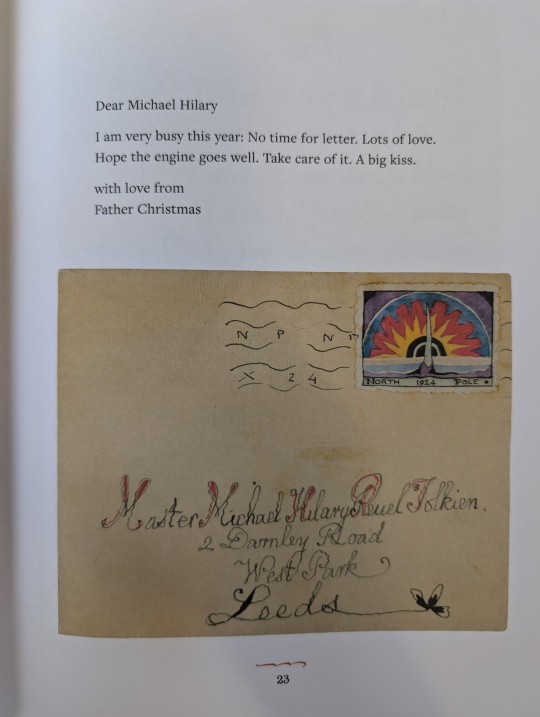
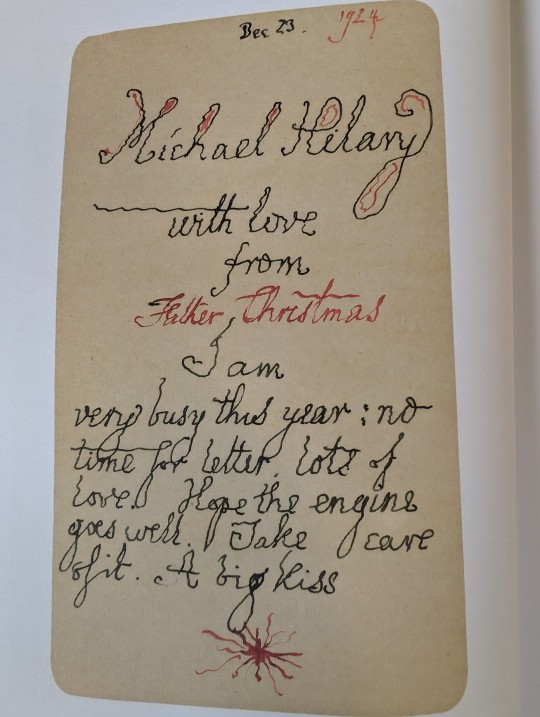
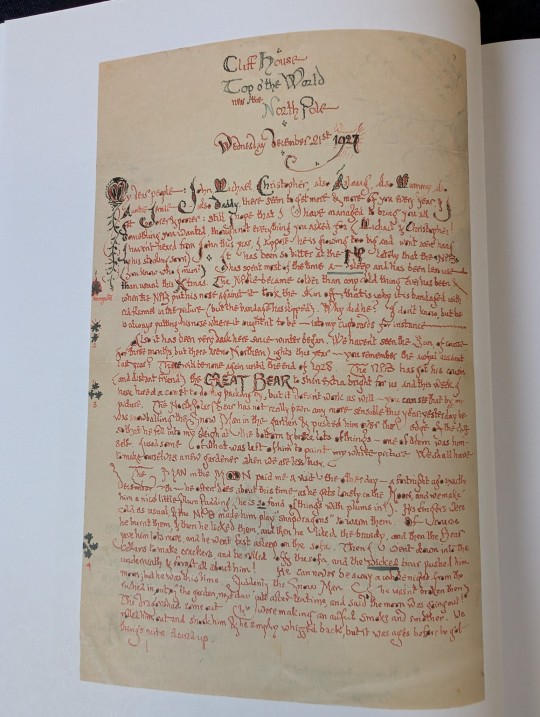
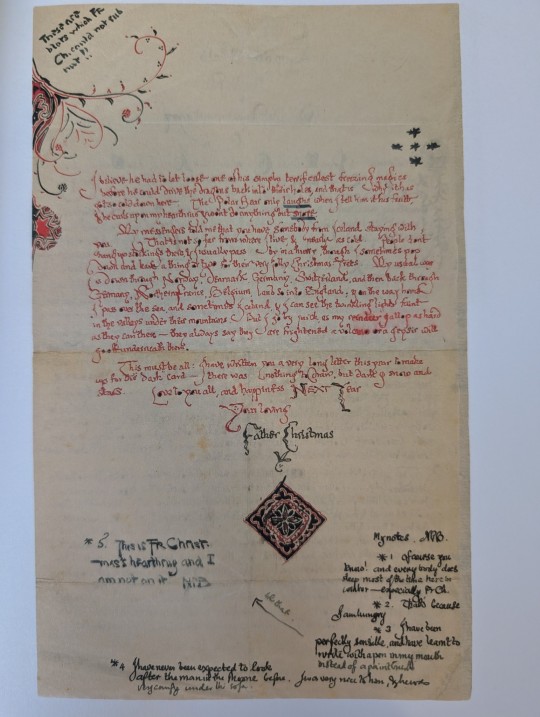
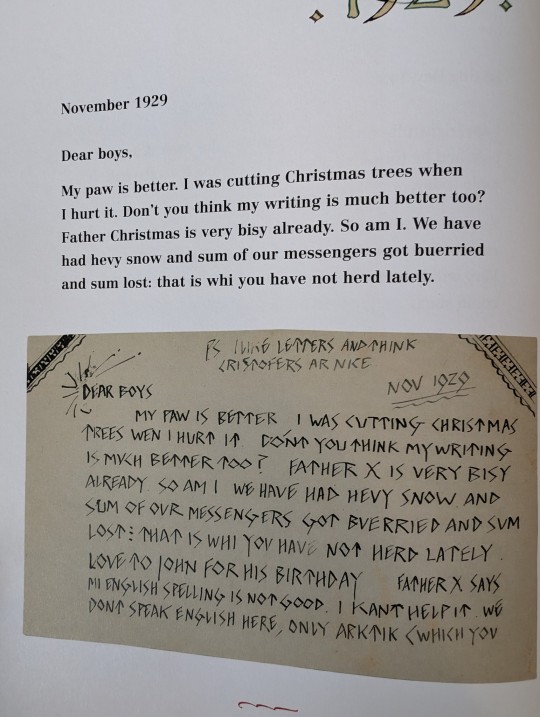
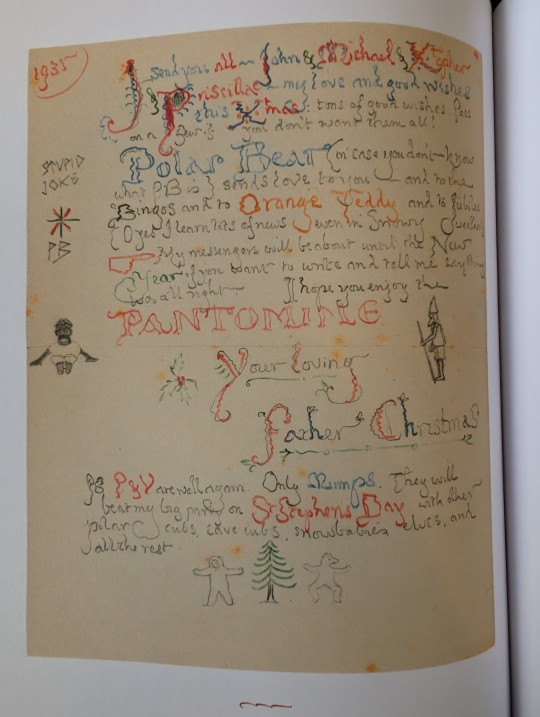
Just a reminder that, in addition to everything else, Tolkien was more dad than any of us could ever hope to be.
#jrrtolkien#lord of the rings#tolkien#letters from father christmas#jrrt#christmas#santa claus#father christmas#the most wholesome thing i've ever seen#jrr tolkien
38 notes
·
View notes
Text
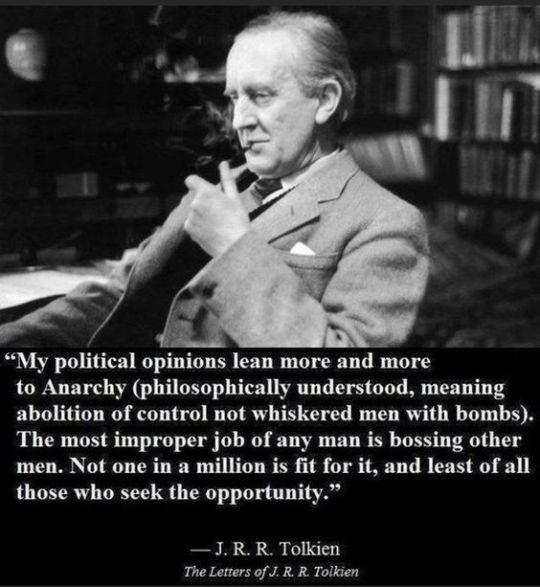
231 notes
·
View notes